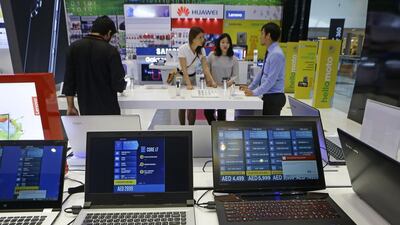DUBAI // Shoppers are paying up to 50 per cent more in the UAE than in other countries for a range of consumer goods – even before the new value added tax is introduced next year.
An investigation by The National shows that the greatest differences are in the cost of clothing, shoes and furniture.
Nike LeBron XIV trainers cost the equivalent of Dh642 in the United States and Dh684 in Britain, but Dh839 in the UAE.
A cotton-blend T-shirt from H&M costs Dh32 in the UK, but Dh49 in the UAE. A Billy bookcase from Ikea costs Dh83 in Britain but Dh115 in the UAE. British prices already include VAT at 20 per cent.
VAT – essentially a tax on goods and services – will be introduced in the six GCC countries on January 1 next year, at a rate of 5 per cent. About 100 items will be exempt, including basic food items, health care, essential medicine, education and the sale and lease of residential property.
Nevertheless, many prices will rise and consumers are concerned. “My worry is that my monthly grocery bill should not go up,” said Carla Stephenson, a housewife.
“School fees are already expensive and rents have not come down by much so if other prices move up, of course it will affect people.
“I understand that basic food will not be taxed but will cheese, cake, ice creams and juice cost more? That will affect families.”
The price differentials with other countries will put pressure on many retailers to absorb the cost of the new tax, rather than pass it on to consumers.
Many businesses say their prices are higher in the UAE than elsewhere because of the cost of transport and storage.
Some experts say that is not always the case.
One of them, David Daly, who writes about VAT for The National, said that in theory all prices should be the same in all markets, subject to transport and storage costs and allowing for local market strength as measured by relative currency values.
“Transport is something of a red herring these days as long as the goods are moved by sea. The incremental cost of a nautical mile is irrelevant,” he said. “Storage costs are based on a number of factors, but the key one is the nature of storage. If it requires chill or frozen, then costs ratchet for the time between shipment and receipt.
“Where space is plentiful and cheap, as in the US, then there’s little incremental cost. If space is at a premium, as in Singapore, then it’s high.”
Mr Daly also said that import, protectionist or social engineering duties can distort local pricing.
“Cigarettes in the UK are astronomically higher than the UAE due to attempts to stop people smoking,” he said.
However, although cigarettes in the UAE are cheap, the price of tobacco is subject to change once excise tax comes into effect.
As for general retail, for which the UAE is a destination, disparity in pricing is due to many factors, including a fashion season and climate that are out of sync with the rest of the world, Mr Daly said.
“The fashion season is short, so it is often required to air freight in the goods, which is much more expensive,” he said.
“Electronics are typically a larger ticket purchase, so expatriates tend to purchase at home and bring the goods, such as laptops and mobiles, with them. That presses prices down in the UAE.”
David Macadam, chief executive of the Middle East Council of Shopping Centres, said most food in the UAE was imported by air, which raised prices.
“To get the diversity that we have, it becomes expensive,” he said. “The way we get it, fresh every day, is through airlines and air freighters, and you’ve got the jet fuel cost on that.”
Mr Macadams also said that the strong dollar, to which the dirham is pegged, has a dramatic impact.
“This makes things, such as goods and services, reasonably expensive relative to the rest of the world,” he said.
dmoukhallati@thenational.ae

